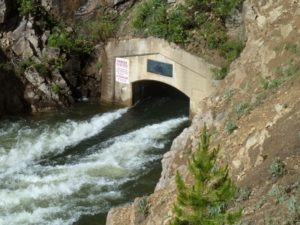When Durango attorney Gerry McDaniel and I walked into the Colorado Water Congress in 1991, we felt like strangers entering a saloon in old western movies – the piano player stops while the entire room stares. I was president of Club 20 and Gerry chaired its Water Committee. Several Western Slope legislators were already there: State Reps. Scott McInnis, Danny Williams, and Tim Foster, and Senators Dave Wattenberg and Tillie Bishop.
Legendary Denver Water Board lobbyist Sarah Duncan (coincidentally a former Durango resident and friend of Club 20) approached us with her usual wry smile and said, “I suppose you’re all here to talk about basin-of-origin again.” She knew it well.
 The never-resolved water issue known as “basin-of-origin protection” had been a top Western Slope priority for a decade by then. Club 20 had passed a strong resolution supporting legislation sponsored by our statehouse delegation. For eight years, it was led by House Majority Leaders Scott McInnis and Tim Foster. Despite their seniority, effectiveness, and popularity in the House, they were continually outvoted on this issue by the big Front Range cities. Our Club 20 group met the same fate that day, trying in vain to convince the Colorado Water Congress, the powerful association of Colorado water districts.
The never-resolved water issue known as “basin-of-origin protection” had been a top Western Slope priority for a decade by then. Club 20 had passed a strong resolution supporting legislation sponsored by our statehouse delegation. For eight years, it was led by House Majority Leaders Scott McInnis and Tim Foster. Despite their seniority, effectiveness, and popularity in the House, they were continually outvoted on this issue by the big Front Range cities. Our Club 20 group met the same fate that day, trying in vain to convince the Colorado Water Congress, the powerful association of Colorado water districts.
The “basin-of-origin” concept is simple. No water should be diverted from the Western Slope, across the Continental Divide to the Front Range, without protection for the river basin from which the water is taken. The most common form of protection is “compensatory storage.” That is, reservoir and diversion tunnel projects that take water away should also provide another reservoir for local storage, so the Western Slope retains the ability to develop water in the future. That idea was well understood by the 1930s, with federal construction of the Colorado Big Thompson Project. It included ten reservoirs, 18 dams, six power plants, and a Continental Divide tunnel. But it also included “compensatory storage” for the West Slope. That’s why Green Mountain Reservoir was built first, to supply future water needs in Western Colorado.
Colorado water law has always allowed water conservancy districts to divert water out of the Colorado River Basin – only if it will “not impair or increase the cost of present or future water supplies for the exporting basin.” What a loophole. That restriction only applies to conservancy districts, but not to cities. And most trans-mountain diversions were built by cities – Denver, Aurora, Colorado Springs, and Pueblo. “Basin-of-origin” legislation would apply that same compensation requirement to every future project, whether proposed by a water district, a city, or anyone else. Without such protection for the basin-of-origin, the Western Slope has never supported trans-mountain diversions, and never will.
The legislative saga continued for years. A particularly notable effort in 2001-02 was led by Rep. Matt Smith, whose bill was among the toughest introduced over the years. It would have made future diversions contingent on compensation acceptable to local leaders in the basin-of-origin, essentially giving veto power to the Western Slope. In 2003 Rep. John Salazar carried a similar bill, followed by Rep. Josh Penry the next session, and several others since then. But all were killed by the same Front Range coalition.
The debate has quieted somewhat, because of a compromise in Governor Hickenlooper’s 2015 Colorado Water Plan. It included the principle that “future Western Slope needs should be accommodated as part of a new trans-mountain diversion project.” That could mean either compensatory storage or money, but either way “a new trans-mountain diversion would move forward only as a package that also accommodates both the eastern and western slopes.” That’s a start, crafted from years of round-table meetings, but it lacks the force of law. Future Governors and Legislatures can change it.
Nor is that assurance universally accepted. The 2018 Legislative Policy Agenda for the City of Loveland, for instance, still includes the defiant position that “Any basin of origin bill must not unduly inhibit Loveland’s ability to acquire… water rights and change the use of any such rights for inclusion in Loveland’s water supply system.”
That’s why Club 20 still “insists that any project which includes trans-basin diversion must include basin-of-origin protection and/or mitigation” acceptable to the local governments.
Following defeat of the 2002 bill, Rep. Matt Smith warned that without such protection, there would never be another trans-mountain diversion in Colorado. He was right – there hasn’t been, and there won’t be. A new legislature and new governor coming to power in 2019 have a rare opportunity to prove they care about the Western Slope, and pass permanent basin-of-origin protection.
A version of this column appeared in the Grand Junction Daily Sentinel November 16, 2018.




Comments on this entry are closed.